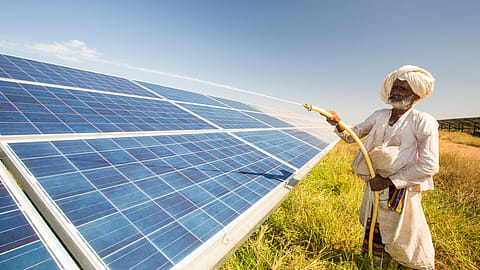Shadow of safeguard duty looms above solar projects
Adani Group is a part of four other solar panel manufacturers who sought protection against Chinese and Malaysian imports.

What has happened in the solar power industry over the last three-and-a half-years is nothing short of remarkable. In perhaps the best examples of a successful policy thrust for an industry, solar power generation capacity has shot up more than five-fold while tariffs have crashed more than 60% since May 2014 as developers in India procured the most cost-efficient solar panels from across the world.
For the first three years, the Prime Minister Narendra Modi-led government resisted pressure from domestic solar panel manufacturers to restrict imports as the government appeared keen to power through to its promise of having 100,000 MW of solar power generation capacity in place by 2021.
But finally, Make in India appears to have taken greater priority than cheap solar power. The Directorate General of Safeguards, investigating an application by five solar panel manufacturers including an Adani Group firm, last week recommended a 70% safeguard duty on solar panel imports from China and Malaysia.
While the Finance Ministry still has to accept the Directorate General of Safeguards’ recommendation and there is no guarantee that it will, industry experts are already expressing concerns on the impact of such a levy on the solar power industry.
In a report released on Wednesday, ratings agency CRISIL said that such a move will put 3,000 MW of solar power projects under implementation, worth over Rs 12,000 crore, at risk. “The 70% safeguard duty proposed will inflate project costs by almost 25% and crank up the viable tariff to Rs 3.75 per unit from around Rs 3 per unit estimated earlier, making solar power less attractive to discoms,” said Subodh Rai, senior director, CRISIL Ratings.
More worryingly, CRISIL anticipates developers may seek to invoke a ‘change in law’ clause which power purchase agreements typically include. However, invocation of such clauses will be a first for solar power projects. Going by the example of how the ‘change in law’ clause has led to protracted legal battles between thermal power producers and discoms in the past, the solar power sector now appears destined to face uncertainty.
“Prolonged uncertainty on the quantum and timing of implementation of the safeguard duty will reduce developer interest in future bids and also impact investor confidence in terms of certainty of returns,” says Manish Gupta, director, CRISIL Ratings.
Recommended Stories
Vinay Rustagi, managing director of Bridge To India, a consultancy firm specialising in solar power, wrote in a report released last week that the decision to impose a safeguard duty on solar panel imports suggests that renewable energy may even be losing its place in the government’s priority list of policies as it grapples with various challenges including revival of economic growth.
“Upcoming general elections, due in 2019, mean that the political stakes are high. Clearly, the Ministry of New and Renewable Energy and the 100 GW solar target are struggling to get the desired attention in this complex set of circumstances. The Ministry of New and Renewable Energy has been making soothing noises but the events of last six months are not reassuring,” Rustagi said in his report.